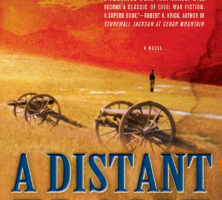Georgia novelist Philip Lee Williams’s A Distant Flame (2004) is about the struggle of an old man, Charlie Merrill, to make sense of his memories and his life. Williams’s most ambitious and successful novel to date, A Distant Flame received the 2004 Michael Shaara Prize for Civil War Fiction and in 2005 was among the Georgia Center for the Book’s top twenty-five notable books by Georgia authors.

A veteran of the Civil War (1861-65) and small-town newspaper editor, Charlie Merrill is known nationally for his columns and books. Through alternating chapters set in 1861-63, 1864, and 1914, the novel recounts a love story, a war story, and Charlie’s efforts to come to terms with his life. The novel’s final chapter is set in 1918.
The chapters covering 1861-63 follow the relationship between Charlie, who lives in fictional Branton, Georgia, and Sarah, a girl from Boston, Massachusetts, who has come to live with her uncle in Branton while her parents are divorcing. The relationship ends in 1864, when Sarah leaves for England to live with her father. The chapters set in 1864 recount Charlie’s experiences as a soldier and sharpshooter with the Confederate army as it retreats before Union general William T. Sherman’s forces, during the Atlanta campaign. (E. L. Doctorow’s contemporary novel The March [2005] continues the story of Sherman’s march to the sea, from a primarily Northern perspective.) From the vantage point of an old man in 1914, Charlie prepares to deliver a speech commemorating the fiftieth anniversary of the Battle of Atlanta. While doing so he recalls his wartime experiences and his relationship with Sarah.
Williams’s research for A Distant Flame was prodigious, and his detailed knowledge of the Civil War provides a rich historical context. In his afterword, Williams describes how he prepared to write the novel by reading letters, journals, diaries, and other accounts from the era. Through such firsthand sources, he learned much about how men and women from that era talked and thought, and there is good reason to trust the novel’s portrayal of life on the home and battlefronts during the Civil War. (The town of Branton is based on Madison, where Williams grew up.)
The novel focuses mainly on the white inhabitants of a small Georgia town, but Williams is careful to document the social realities of the times in which they lived, including the reality of slaves and slavery. Although he shows a close relationship between the Merrill family and some of their slaves, he makes clear that the slaves had no choice in their condition, that their lives were constrained, and that sometimes they expressed unhappiness about their condition. As an old man, Charlie is convinced that slavery was an evil.
A Distant Flame does not glorify the Civil War or the Old South but instead offers intense and convincing descriptions of combat, and conveys an understanding of the unpleasant and unworldly horrors of battle—not only the violence and carnage but also the unhealthy conditions in which solders lived and often died. Charlie does not go to war out of Southern patriotism but rather for personal reasons—out of grief over losing Sarah and over the deaths of family members. Though he sympathizes with the Confederate cause, Charlie never embraces it, and his sense of distance, his indifference, and his ability to view the conflict between North and South from both sides enables him to see the war more fully than a biased observer could manage.
Ultimately A Distant Flame is about Charlie’s efforts to understand and accept the realities of his life, including his lost love, the fates of family members, his experiences during the retreat toward Atlanta, his feelings about war, and his sense of himself as a journalist and a public citizen. It is similar in that respect to Williams’s first novel, The Heart of a Distant Forest (1984), which is also about an older man assessing the progress of his life. In the end, Charlie achieves some sense of accomplishment for his life, yet he also feels disappointed and bitter. His disappointment illuminates one major theme of the novel: as we grow older and look back at our past, life seldom seems as full as we would like.






